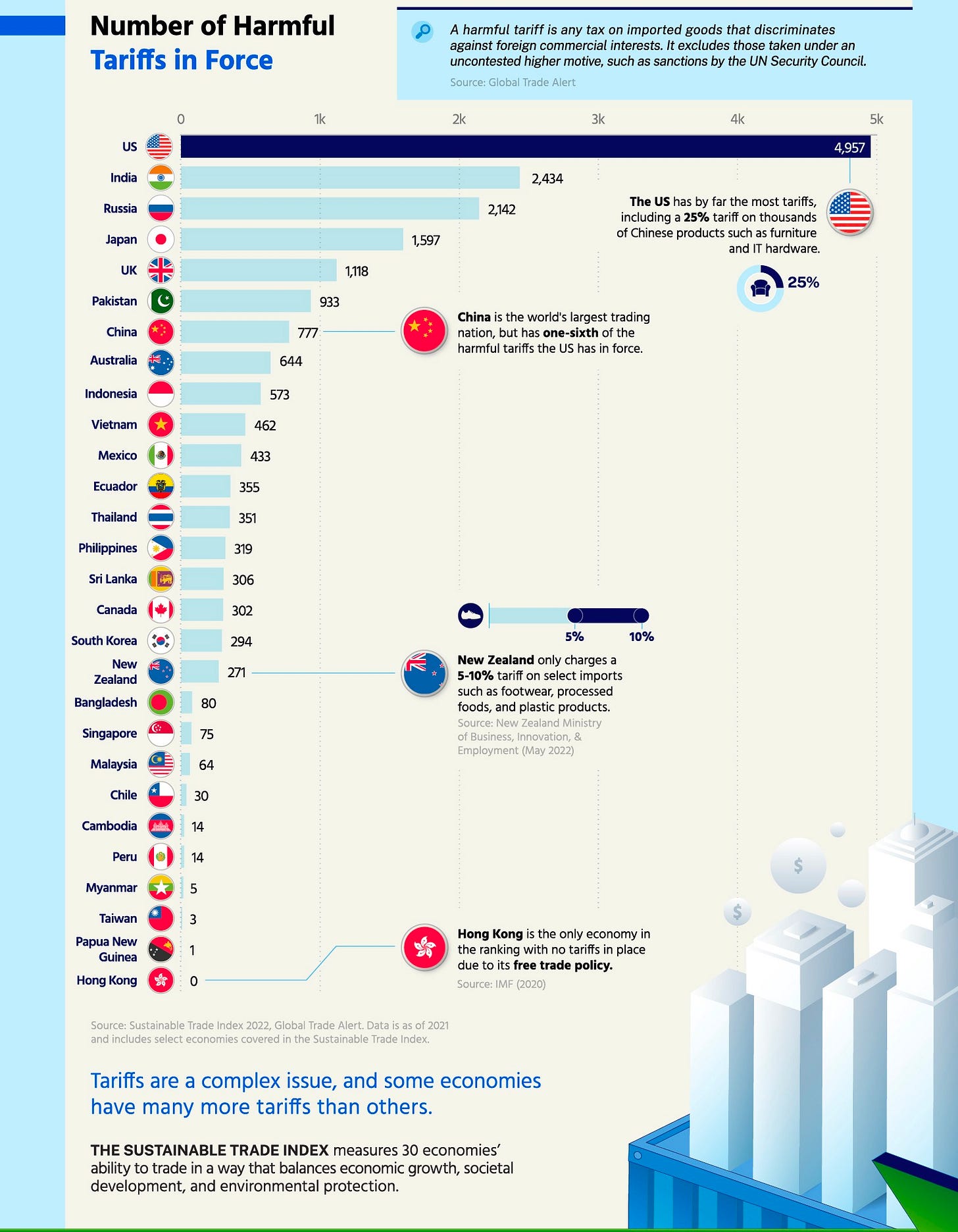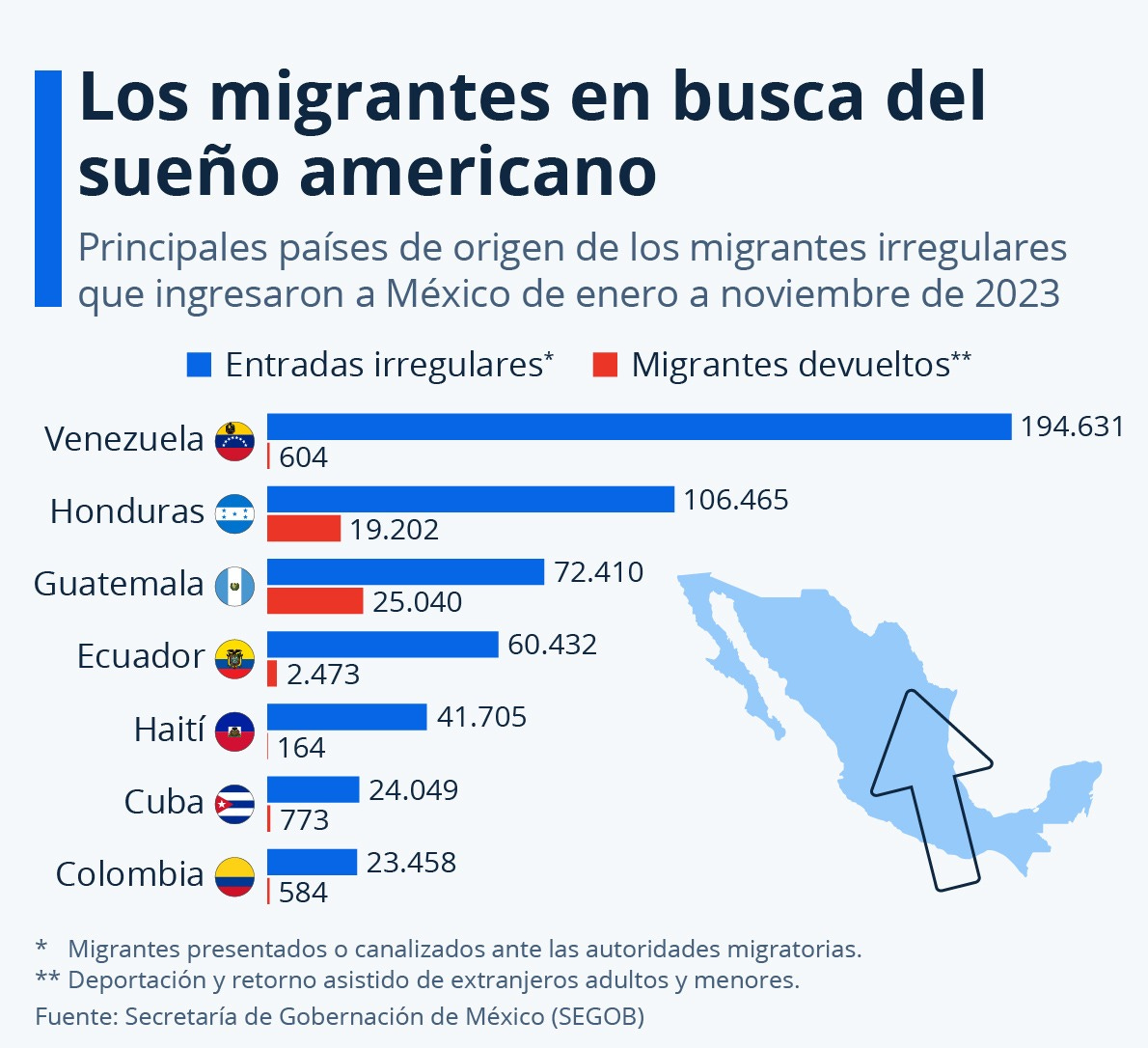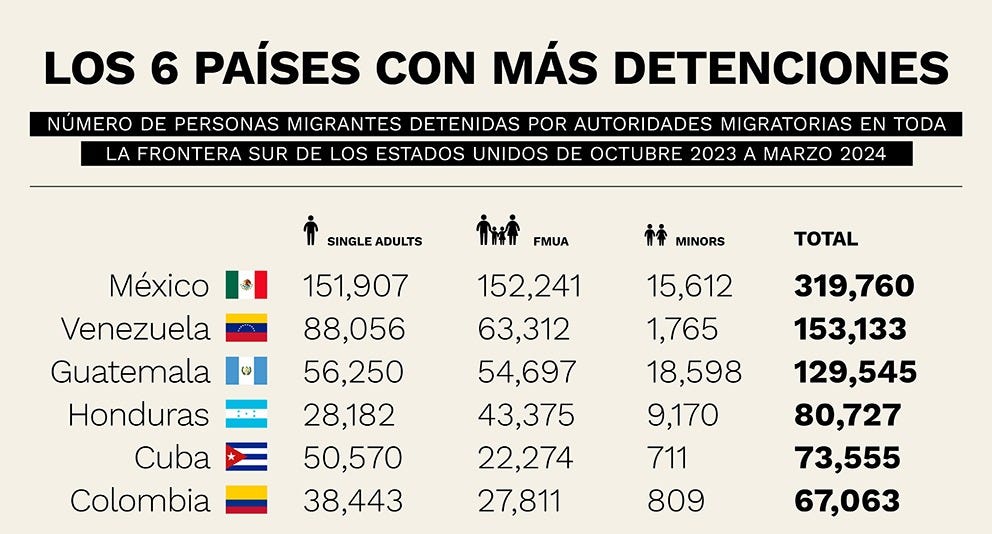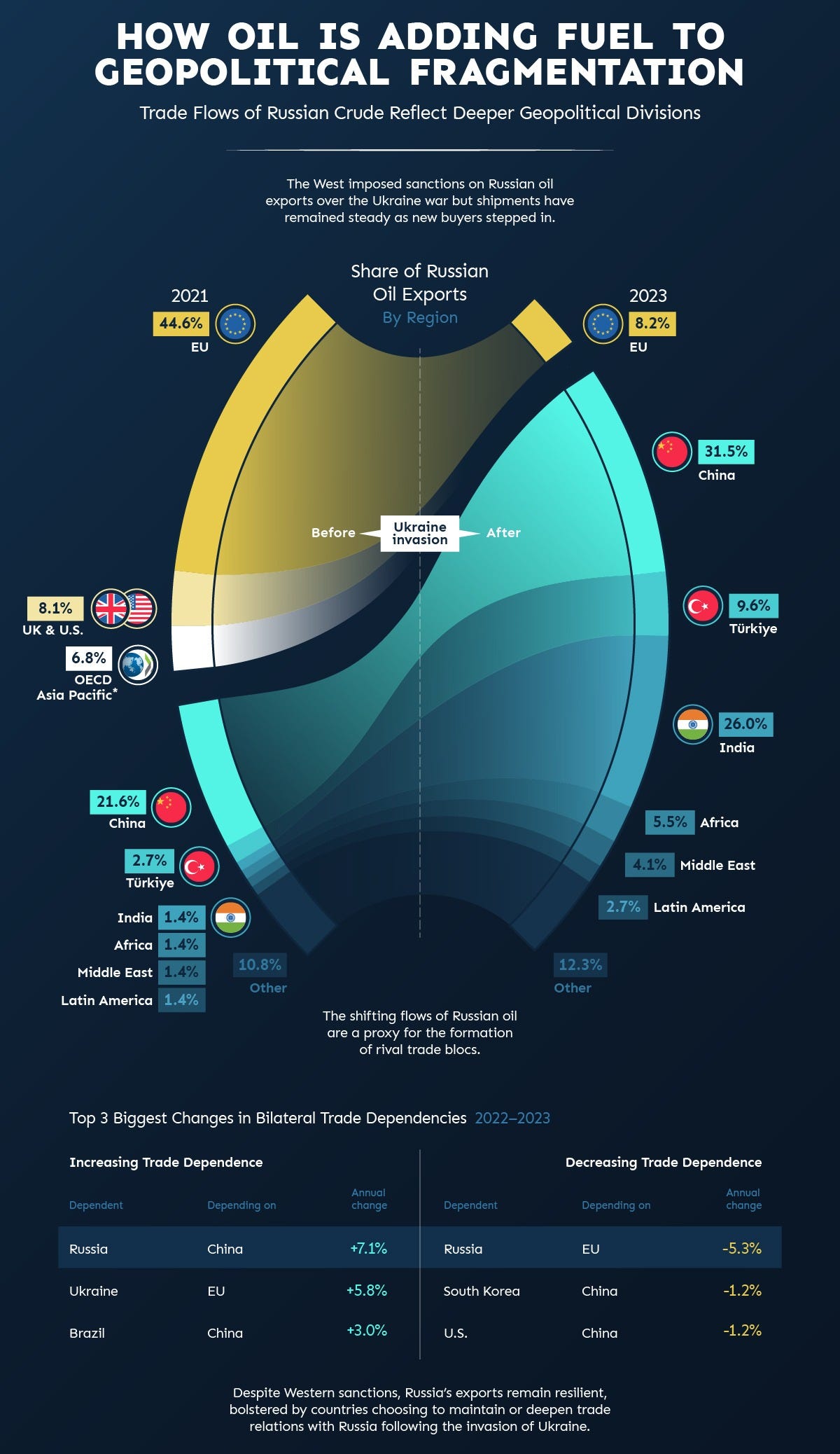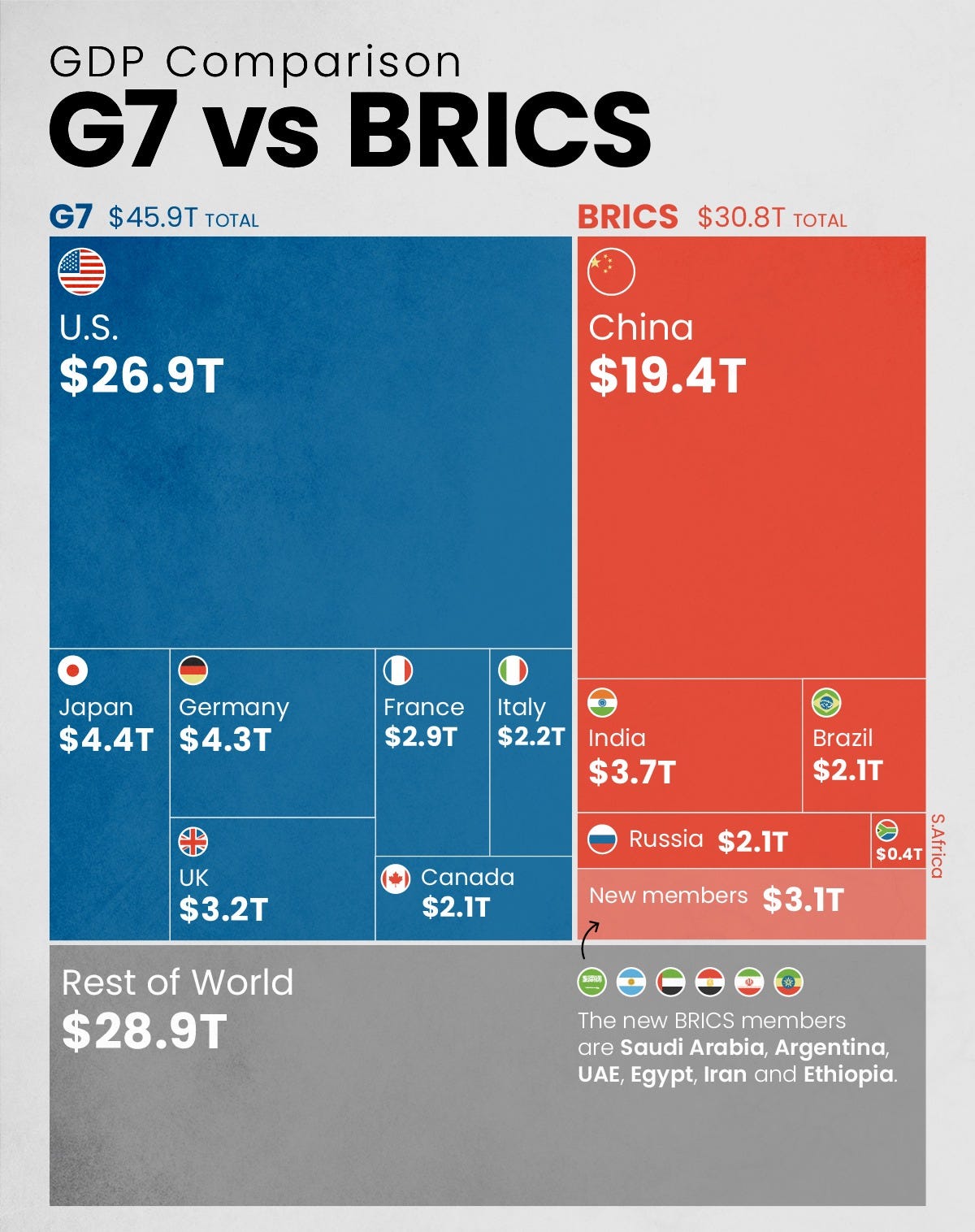MEXICO: TAKES ACTION TO AVOID TARIFFS
“Mexico will stop the people heading to our southern border, effective immediately. This will greatly help in stopping the illegal invasion of the United States. Thank you!”. Trump
Sheinbaum says she is confident that Mexico can avoid U.S. tariffs: "We will reach an agreement"
"I am convinced that we will reach an agreement, defending our sovereignty, respecting Mexicans and respecting Mexico," said Sheinbaum at her press conference.
The main trade partner of the United States has a plan in case Trump imposes tariffs, but Sheinbaum, who spoke by phone with the U.S. president-elect on Wednesday, says she doubts it will be necessary to implement it.
Instead, she said Mexico and the U.S. can collaborate on Trump's concerns about migration and drug trafficking. She insisted that Mexico would not subordinate itself to the United States in doing so.
"I am convinced that we will reach an agreement, defending our sovereignty, respecting Mexicans, and respecting Mexico, with the collaboration that one government should have with another," Sheinbaum said. "If it happens, yes, we have a plan. But the goal is for it not to happen."
Mexico's proposal to avoid U.S. tariffs
Economy Secretary Marcelo Ebrard presented a plan titled "Mexico's Proposal: A Prosperous and Competitive Region" at the National Palace, which includes the following:
Regional stability: Strategic cooperation on security, migration, and governance to ensure a reliable and safe region.
Shared prosperity: Create well-paid jobs through investment in critical infrastructure (modern borders, clean energy, and efficient transportation).
Global competitiveness: Tariffs fragment our integrated industry, raise production costs, and weaken us against Asia and Europe. We must optimize regional supply chains, keep costs low, and ensure that our products lead global markets.
In this regard, Ebrard revealed that Mexico's proposal to Trump's transition team will focus on strengthening "regional stability," "shared prosperity" with well-paid jobs and infrastructure investment, and boosting "global competitiveness" by optimizing supply chains in North America. El Financiero
Claudia Sheinbaum Confirms Migrant Caravan Will Not Reach the U.S. Following Call with Donald Trump
Amid the departure of the migrant caravan heading to the U.S., where hundreds of people are traveling from various states in Mexico, President Claudia Sheinbaum assured that during a phone call with U.S. President-elect Donald Trump, she informed him that the caravan would not reach the U.S. border.
“I told him that the caravan he mentioned in his post will not actually reach the northern border. He acknowledged this effort, and we also discussed other topics,” Sheinbaum said.
This comes after Trump commented on the group of people mobilizing through Mexico.
“Mexico will stop the people heading to our southern border, effective immediately. This will greatly help in stopping the illegal invasion of the United States. Thank you!” Trump said regarding measures taken to halt the migration.
Regarding the so-called “illegal invasion” strategy, Sheinbaum emphasized that Mexico has been implementing migration control measures for some time, which will continue to be strengthened to prevent caravans. The goal is to keep migrant mobilizations towards the U.S. from happening.
She also mentioned that Mexico will continue to collaborate with other countries, especially El Salvador, Honduras, and Guatemala, by providing support programs such as Sembrando Vida (Sowing Life) and Jóvenes Construyendo el Futuro (Young People Building the Future), to address the root causes of migration.
On November 27, Trump shared that he had a conversation with Sheinbaum, praising her decision to stop the migrant caravan. "I just had a wonderful conversation with the new President of Mexico, Claudia Sheinbaum Pardo. She has agreed to stop migration through Mexico to the United States," Trump stated.
In response, Sheinbaum confirmed the caravan would indeed be halted and outlined the alternatives for support. “I presented the migration strategy that has been in place for months and was strengthened starting in January 2024 due to an increase in migration in late 2023. We are enhancing this strategy, which includes various actions,” she said.
She reaffirmed that part of the strategy is to offer employment opportunities, provide shelter, and repatriate migrants to their countries of origin. Infobae
Governance Coordinates Actions to Address Migratory Flows between Mexico and Guatemala
Rosa Icela Rodríguez indicated that there will be no change in Mexico's immigration policy strategy.
The Secretary of the Interior, Rosa Icela Rodríguez, held a meeting this Sunday with officials from Mexico and Guatemala to coordinate actions to address migratory flows between the two nations.
In a message posted on social media, the head of domestic policy announced that she met with Alfredo Danilo Rivera, Director of the Guatemalan Institute of Migration; Francisco Garduño, still the Commissioner of Mexico’s National Institute of Migration; and Arturo Medina, Undersecretary for Human Rights, Population, and Migration from the Secretariat of the Interior, among others.
The meeting was also attended by Hazael Ruiz, head of the Coordination for Comprehensive Attention to Migration on the Southern Border, and Carlos Vázquez, former head of the Immigration Policy Unit, who has been mentioned as the upcoming coordinator of the Mexican Commission for Refugee Assistance (Comar).
"We coordinated actions to address the migratory flows from both nations," said Secretary Rodríguez.
On Monday, Rodríguez also visited the San Lázaro Palace to meet with members of the Political Coordination Board of the Chamber of Deputies, where migration was also discussed.
According to Ricardo Monreal, coordinator of the Morena parliamentary group, Rosa Icela Rodríguez assured legislators that the Mexican government is prepared to respond firmly to any threat or action by the incoming U.S. government under President Donald Trump regarding migration. Milenio
"Mexico and the United States Complement Each Other, They Do Not Compete"
President Claudia Sheinbaum Pardo expressed confidence that Mexico will maintain a positive relationship with the United States.
During her visit to Nuevo León, the Morena party leader highlighted the benefits of the North American Free Trade Agreement (NAFTA) between Mexico, the United States, and Canada. She emphasized that together, the three countries contribute to 30% of the global GDP.
"Mexico and the United States complement each other, they do not compete," Sheinbaum stated. She assured that the relationship between the two nations would remain one of respect, dialogue, and collaboration.
"Our vision is Mexican Humanism and fraternity between peoples and nations worldwide," she added.
She also pointed out that Mexico is currently the leading exporter to the United States, which benefits not only Mexico but also its neighbor. She has long maintained that their economies complement each other rather than compete. El Porvenir
What is the ‘Limpieza’ operation announced by Ebrard against illegal goods from Asia?
Ebrard confirmed that the ‘Limpieza’ operation was an order from President Claudia Sheinbaum.
The Mexican government plans to carry out a nationwide operation to combat the flow of illegal goods entering the country, mainly from China, according to the Ministry of Economy.
Secretary Marcelo Ebrard stated that the operation, named "Limpieza" (Cleaning), was initiated by President Claudia Sheinbaum. The operation will target not only those selling smuggled goods in the country but also the customs agencies that allow their entry, transporters moving them within the country, and those renting premises for their sale.
Collaboration will be sought from the Ministry of Finance, the Tax Administration Service, and the National Guard.
What is the ‘Limpieza’ operation about?
Mexico announced on Friday the launch of a nationwide plan against smuggled and counterfeit goods. The operation will take place across all 32 states, including ports and airports, and began the day before with a large operation at a shopping plaza in downtown Mexico City.
“This is an operation that must be permanent; the law must be upheld,” said Economy Secretary Marcelo Ebrard at a press conference. “This is about supporting and protecting Mexican industry, established industries in Mexico, and businesses that respect the law,” he added.
In Thursday’s operation at one of the many plazas in downtown Mexico City known for selling various products at very low prices, more than 262,000 illegal items were seized. These products lacked any documentation proving their entry into the country and, in many cases, were not even labeled.
Why implement the ‘Limpieza’ operation?
When asked by journalists if the operation was a message to Trump, Ebrard joked that he had not received any calls from the U.S. president-elect regarding the specific shopping center in Mexico City that was raided. El Financiero
Mexico rules out responding to the U.S. with tariffs: Ebrard
"There are two alternatives on the table: we can fragment and divide ourselves with accusations and tariffs – we can do that if we want, because they impose a tariff, and we impose another, and Canada imposes another, and it will be an endless division – or we build together a strong and competitive region," he argued.
The secretary stated that he has received support from companies in the aerospace, agricultural, and financial sectors. El Financiero
Mexico has a plan if the U.S. imposes tariffs on oil: Sheinbaum
"If it were to happen, we still have a plan, but the ideal is for it not to happen," replied President Sheinbaum.
President Claudia Sheinbaum said on Friday that the country has a plan in case the United States imposes tariffs on crude oil exported from Mexico.
U.S. President-elect Donald Trump said on Monday that he would impose a 25% tariff on imports from Canada and Mexico until they take drastic measures against drugs, particularly fentanyl, and migrants crossing the borders illegally. The measure does not exclude crude oil, Reuters reported.
"If it were to happen, we still have a plan, but the ideal is for it not to happen," Sheinbaum responded to a specific question on the topic. Most of the oil exports from the state-owned giant Pemex are directed to the U.S. market. El Financiero
VECTOR SALES AND TRADING DESK
BIMBOA: Files Statement of Claim Against Maple Leaf Foods Inc. and Former Senior Officers and Directors Seeking More Than CAD $2 Billion in Damages.
At the time Canada Bread was sold to Grupo Bimbo, Maple Leaf was the 90% owner, controlled Canada Bread, and led the transaction negotiations and diligence process. Following the sale, in 2017 Canada Bread was the subject of a price-fixing investigation within the commercial bread industry by the Competition Bureau. A subsequent prosecution resulted in Canada Bread paying a fine of CAD $50 million in 2023 and an on-going class action brought against market participants.
We see this as neutral for the company, as it is primarily noise. The fine has already been imposed and settled. It is hoped that the company will derive some benefit from this matter moving forward.
Q*: Gained +4.1% on Thursday Nov 28yh the company celebrated its Investor day
The company celebrated its Investor Day, where it presented growth opportunities in Mexico and its international subsidiaries. The event covered various topics such as the company’s corporate governance, strategic development plans, international expansion, and initiatives for technological integration and risk prevention.
ASURB: $42 Tax on Cruise Passengers Threatens Mexico's Tourism Appeal. If the number of cruise tourists decreases, there could be a reduction in overall international visitors to the region.
The Confederación Patronal de la República Mexicana (Coparmex) has expressed concern over the potential negative impact of a proposed tax on cruise passengers in Mexico. The tax, known as the Derecho de Visitante sin Permiso para Realizar Actividades Remuneradas (DNR), would impose a $42 fee per cruise visitor. Coparmex argues that this fee could increase tourism costs in Mexico by 213% compared to other Caribbean destinations, such as Punta Cana, and significantly harm the country’s competitiveness in the international tourism market.
The DNR tax could add over $200 in costs for a family of five, potentially discouraging cruise lines from visiting key Mexican destinations like Mazatlán, Acapulco, Zihuatanejo, and Puerto Vallarta, which rely heavily on cruise tourism. Expansion
AGUA*: On December 5th, Grupo Rotoplas will hold the Agua Day 2024, an event where they will present their current and future strategy.
The event will be led by Carlos Rojas, and will feature the company's top-level executives. During the event, they will discuss the main growth opportunities for the group, particularly those generated by nearshoring, which is driving the demand for water solutions in the region due to the relocation of companies to Mexico and Latin America. El Sol de Mexico
BRAZIL: President-elect Donald Trump has threatened to impose a 100% tariff on BRICS. It is clearly a threat to Brazil, since Russia and China already know that they will have a tough time no matter what. India has already said it will continue using the USD as its main currency outside of the INR. Then, Argentina has clearly not only rejected joining BRICS, but it is also and will remain a friend of the U.S. After that, South Africa doesn’t matter, nor do Iran and Egypt. I’m not sure about Ethiopia, but I imagine the UAE is probably calling the U.S. right now to confirm their alliance to the USD.
President-elect Donald Trump has threatened to impose a 100% tariff on BRICS countries (Brazil, Russia, India, China, and South Africa) if they create a new currency to replace the U.S. dollar. Trump stated that these countries must commit to not developing a new currency or face tariffs and exclusion from the U.S. economy.
BRICS has considered reducing reliance on the dollar, with Brazil's President Lula proposing a common currency for South America. However, Russian President Putin has stated that creating a new currency is not a priority.
This threat follows Trump's plans to increase tariffs on Mexico, Canada, and China, citing immigration and security concerns. Trump recently spoke with Mexico's President Claudia Sheinbaum, while Canadian Prime Minister Trudeau had a "productive" meeting with Trump. CNN
VECTOR RESEARCH
What if we let the peso weaken?
Last week, the U.S. president-elect, Donald Trump, surprised everyone by announcing that he would impose a 25% tariff on imports from Mexico and Canada starting on his first day in office, along with an additional 10% tariff on China, until illegal immigration and fentanyl crossing into the U.S. is halted. As expected, the exchange rate was affected, albeit moderately, sparking a debate about whether it would be advisable to allow the depreciation of the peso to counter Trump’s trade policy.
One possible response to the likely imposition of tariffs by the U.S. government would be to allow the peso to weaken. This could partially or fully offset the negative effects of these tariffs on Mexican competitiveness, as a weaker peso would make our exports cheaper for U.S. and other foreign buyers.
The weakening of the peso would not jeopardize the Mexican economy, not only because the depreciation would start from a low base, but also because internal macroeconomic fundamentals are strong. The external balance is almost in equilibrium. Last week, it was reported that the current account of the balance of payments (the difference between the country’s overall income and expenses) showed a surplus of 0.2% of GDP in the third quarter of this year. This indicates that there is no financial urgency, unlike in 1982 and 1994 when deficits reached nearly 6.0% and 9.0% of GDP, respectively.
This context eliminates the possibility of a speculative attack on the peso. If one were to occur, which is unlikely, the country has a variety of tools to control it, with the most important being communication regarding the potential to intervene in the exchange rate market, followed by the level of international reserves, which stood at $226 billion at the end of the previous week. This level is significantly higher than what was available in those difficult years. Additionally, authorities now have other tools like currency hedges, as well as the IMF credit line.
The peso’s depreciation would not significantly affect inflation. According to studies by Mexico’s central bank, the pass-through of depreciation to final prices is limited, so a major spike in prices should not be feared. Furthermore, fiscal policy could support the fight against inflation as it is expected to be less expansive.
Exports would benefit from currency depreciation, especially those of net exporters (a large part of Mexican manufacturing imports to export), which could improve the level of economic activity.
However, it’s important to note that in Mexico, the peso is not an exogenous variable or an economic policy instrument. The exchange rate is free and subject to the forces of supply and demand in the foreign exchange market. Therefore, responsible authorities would need to induce its depreciation. The best way to do this would be through a reduction in interest rates, which would make Mexican assets less attractive to foreign investors and encourage domestic investors to seek alternatives in other markets.
This provides a reason for interest rates to decrease even further in Mexico. Minutes from the latest monetary policy meeting and recent comments from central bank officials suggest that this is the direction they are heading. The general outlook seems to favor a 50 basis point reduction at the scheduled December meeting, and possibly at the subsequent ones. However, uncertainty regarding U.S. government actions limits any forecasts and only allows for speculative assumptions.
INTERNATIONAL DAY
National Fritters Day is celebrated on December 2 in the United States. This day honors the delicious fried treat known as fritters, which can be made from a variety of ingredients like fruits, vegetables, seafood, or meat, all coated in batter and deep-fried to a crispy, golden perfection. On this day, people often indulge in these tasty treats, experimenting with different flavors and fillings, or simply enjoying classic versions like apple fritters. It's a fun, food-centric observance that celebrates the versatility and deliciousness of fritters.



